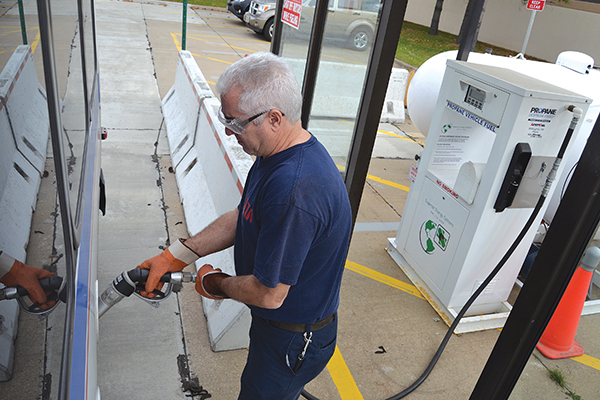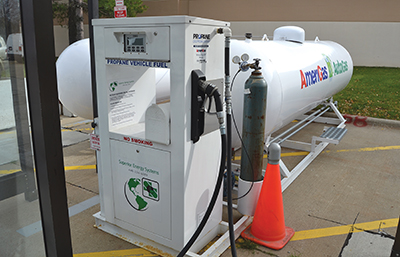
By Todd Mouw
States will soon have access to a windfall of funds from the Volkswagen settlement. Last year, the Environmental Protection Agency filed a complaint against Volkswagen alleging that they violated the Clean Air Act. Volkswagen was found guilty and agreed to spend billions to settle these allegations, which includes a $2.9 billion Environmental Mitigation Trust. These are funds that transit agencies could potentially use toward cleaner operating fleet vehicles.
Reducing NOx
The goal of the Environmental Mitigation Trust is to cost-effectively reduce smog-forming nitrogen oxide (“NOx”) emissions from the transportation sector. NOx are reactive gases that pollute the air, contribute to acid rain and can trigger health problems. Over the next 10 years, the trust will fund environmental mitigation projects that specifically reduce emissions of NOx.
 How does this affect transit agencies? Eligible projects for the Environmental Mitigation Trust include class 4-8 shuttle or transit bus replacement and class 4-7 medium-duty truck replacement. VW’s settlement funding will be used to buy back or modify vehicles.
How does this affect transit agencies? Eligible projects for the Environmental Mitigation Trust include class 4-8 shuttle or transit bus replacement and class 4-7 medium-duty truck replacement. VW’s settlement funding will be used to buy back or modify vehicles.
Propane autogas-fueled transit shuttles, such as the Ford E-350/450 cutaway, would be eligible for this funding. Propane autogas is naturally lower in NOx and other toxic pollutants, like greenhouse gases and carbon monoxide, than diesel and gasoline.
For heavier-duty engines fueled by propane autogas, NOx is reduced by about 60 percent compared with conventional diesel engines. Propane autogas-fueled vehicles also emit 20 percent less NOx than gasoline-powered engines. For example, Cleveland Transit Agency is emitting 125,000 fewer pounds of carbon dioxide for each of its propane autogas shuttles, and Florida’s LeeTran is eliminating 1.8 million pounds of carbon dioxide over the lifetime of its 20 shuttles, compared to conventionally-fueled counterparts.
Propane autogas is the leading alternative fuel in the country and the third most commonly used vehicle fuel, following gasoline and diesel. There are more than 26 million propane autogas vehicles worldwide. Currently, more than a thousand of these alternatively-fueled vehicles are used for transit purposes across the country.
The latest on VW funding
Earlier this year, Wilmington Trust was appointed as the trustee to oversee the administration of the Volkswagen Settlement funds. Wilmington Trust was selected as trustee because of its extensive experience providing trust, custody, escrow and investment management services to public entities, including state governments and Native American tribes. An additional qualification was the company’s significant experience as a trustee for environmental mitigation trusts.
The trustee effective date was established on October 2. Now, each state has 60 days from that date to determine and choose a beneficiary.
The beneficiary is the state-level government entity responsible for developing and awarding its state’s funds. The state beneficiaries will have previous experience managing air quality and transportation grant programs and will be responsible for reporting to the Trustee on the use of funds. They may be state energy offices, environmental protection departments, etc.
Each state will receive a set amount of funding based on the number of affected vehicles sold in the state. State amounts vary from $8 million to $400 million. A state-by-state listing can be found at
www.ROUSHcleantech.com/volkswagen-settlement/.
Once the state’s beneficiary is selected, they will have 90 days to produce a draft plan for how the funds will be allocated. After the state files their mitigation plan, it must be made public for 30 days to open up for comment on the proposed program. Then, the state’s plan will be sent to the trustee for approval.
How to get involved
If the state allocates funding toward transit vehicles, funds from the Environmental Mitigation Trust could be available early next year. Learn who your state’s beneficiary is and talk with them about your transit agency’s fleet goals. Be sure to comment during the public input period to make sure your voice is heard. Transit agencies will need to be prepared to adopt NOx reducing transit vehicles, such as propane autogas, once the money is released if they want to tap into the funding.
Todd Mouw is vice president of sales and marketing for ROUSH CleanTech, an industry leader of alternative fuel vehicle technology. Mouw has served as president of the NTEA Green Truck Association. Reach him at todd.mouw@roush.com or 800-59-ROUSH.
